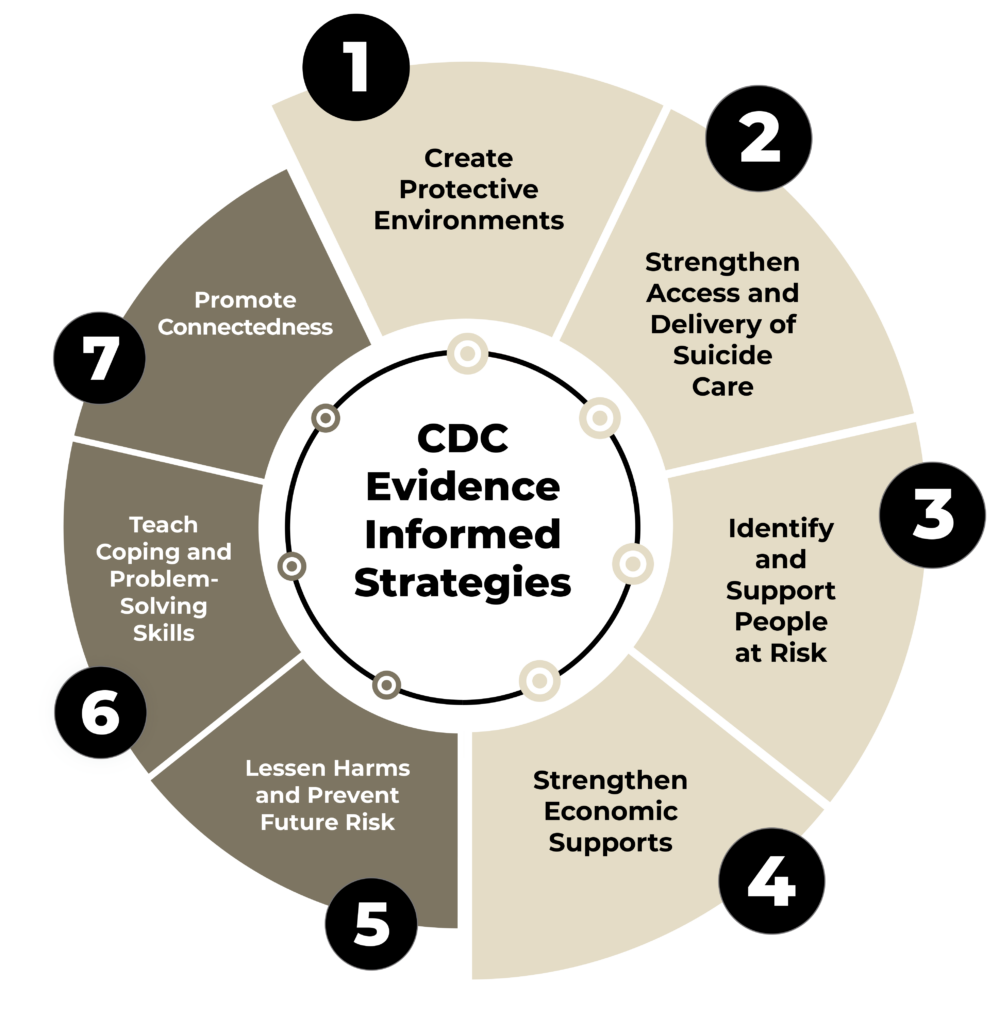Training & Resource Center
The Face the Fight Training and Resource Center provides details on Upcoming Trainings, information on the approach and Focus Areas Face the Fights uses in guiding suicide prevention efforts, and recommended Resources for organizations and individuals. Our UT Health San Antonio team is honored to serve as an academic partner to USAA in Face the Fight.
Learn more at wefacethefight.org or to join, contact: JOIN@WEFACETHEFIGHT.ORG

Face the Fight Monthly Series
Face the Fight Exchange
The Face the Fight Exchange is a monthly series focused on answering the question of “What can I do?” when it comes to suicide prevention. The series will expand the skills, abilities, and knowledge base of individual community members. The series will include presenters from the FTF Coalition facilitated by a FTF Scientific Advisor.

Face the Fight Systemic Solutions
The Face the Fight Systemic Solutions is a monthly series focused on systems and organizational-level opportunities to implement and sustain suicide prevention. Topical areas of focus will include training, screening, postvention policies and support, measuring impact, and employee/volunteer engagement, workforce development, and equitable access to care.

Learn How to Support the Veteran in Your Life
Get access to a curated collection of Veteran suicide prevention training materials and be prepared to make a difference in the lives of Veterans, service members, and their loved ones. Start learning today and earn a digital certificate when you complete our Face the Fight™: Basics of Veteran Suicide Prevention training program.
Course Eligibility: For Military Service Members, Veterans, Caregivers and Military Families, and those who work with and serve military-connected communities
Upcoming Training Opportunities
Crisis Response Plan (CRP) Workshop
Our UT Health San Antonio team has received funding from Face the Fight to conduct monthly workshops in Crisis Response Planning for Suicide Prevention. These workshops are offered at no cost and are open to any individual who supports veterans in work, as a volunteer, or peer, including veteran-serving mental health clinics and allies of veterans.
Workshop Info

Presented by: David Rozek, PhD, ABPP
Time: 10:00am – 3:00pm CT
Location: Online via Zoom
Eligibility: Open to anyone who supports veterans
Workshop Info

Presented by: Brooke Fina, LCSW, BCD
Time: 10:00am – 3:00pm CT
Location: Online via Zoom
Eligibility: Open to anyone who supports veterans
Workshop Info

Presented by: Brooke Fina, LCSW, BCD
Time: 10:00am – 3:00pm CT
Location: Online via Zoom
Eligibility: Open to anyone who supports veterans
Lethal Means Safety (LMS) Workshop
Nearly 50% of veterans own firearms and over 70% of veteran suicides use firearms. Learn how to discuss promoting voluntary secure storage that can help reduce risk for suicide. Our LMS workshops are offered at no cost and are open to any individual who supports veterans in work, as a volunteer, or peer, including veteran-serving mental health clinics and allies of veterans.
Workshop Info

Presented by: David Rozek, PhD, ABPP
Time: 10:00am – 12:00pm CT
Location: Online via Zoom
Eligibility: Open to anyone who supports veterans
Workshop Info

Presented by: David Rozek, PhD, ABPP
Time: 12:00pm – 2:00pm CT
Location: Online via Zoom
Eligibility: Open to anyone who supports veterans
Workshop Info

Presented by: David Rozek, PhD, ABPP
Time: 2:00pm – 4:00pm CT
Location: Online via Zoom
Eligibility: Open to anyone who supports veterans

Face the Fight Focus Areas
Face the Fight along with most current suicide prevention initiatives, including those at the Departments of Veterans Affairs (VA) and Defense (DoD), the White House, and others follow a public health approach. The public health approach asks questions like: What is the problem, what is the cause, what works, and how do we implement it? Face the Fight focuses on the seven identified evidence-informed strategies (see graphic) that can be paired with evidence-informed interventions.
This public health approach goes beyond individual interventions, focusing on analyzing data to identify risk factors, developing prevention strategies, and creating support systems and resources for those in need. By promoting mental wellness, reducing stigma, and advocating for positive societal changes, this approach aims to build a caring and supportive community, ultimately working together to prevent suicide and protect the well-being of everyone.
The Importance of Evidence-Informed Interventions
What Are Evidence-Informed Interventions for Suicide Prevention?
Presented by: Brooke Fina, LCSW, BCD from UT Health San Antonio & Dr. Meg Harrell, Ph.D. from the Bob Woodruff Foundation
Evidence-informed intervention relies on the best available scientific evidence, ensuring that strategies are effective, efficient, and suitable for addressing specific issues. Such interventions are marked by rigorous scientific scrutiny and focus on well-researched treatments, like those confirmed through randomized controlled trials. These are the gold standard, recommended when strong empirical evidence supports their effectiveness and safety. The process involves systematically reviewing existing research to identify interventions that work best for particular conditions or issues, such as suicide prevention interventions proven to reduce suicide attempts.
Reducing firearm-related suicides involves a multifaceted approach at both clinical and community levels. The goal is to encourage safe and secure storage of firearms and, when necessary, temporary, voluntary removal of firearms from their immediate surroundings. This approach has been well-received by veterans and emphasizes respecting individuals’ autonomy in decision-making.
A commonly recommended approach for suicide screening involves the use of efficient evidence-based tool(s) in both community and healthcare settings. This practice is recommended irrespective of whether the person is seeking care and/or help specifically for mental health concerns.
-
- For example, validated suicide risk screeners include Columbia Suicide Severity Rating Scale (C- SSRS), Patient Health Questionnaire – 9 (PHQ-9)
Managing suicide risk is focused on ensuring that veterans can survive their darkest moments. Interventions are focused on reducing risk factors related to suicide, including increasing social connections, treating psychiatric diagnoses, incorporating means safety strategies, and engaging in safety planning.
-
- For example, Crisis Response Planning (CRP) and Safety Planning Intervention (SPI) are brief, collaborative interventions aimed at reducing acute suicide risk.
Treating suicidal veterans involves the clinician and the individual working collaboratively on identifying and resolving internal and external factors unique and intrinsic to the veteran’s suicide risk.
-
- For example, cognitive behavioral therapies are the most effective intervention methods for reducing and preventing suicidal thoughts and behaviors.
Subscribe to Our Newsletter



